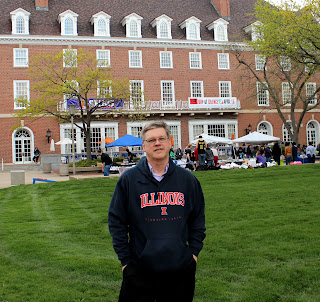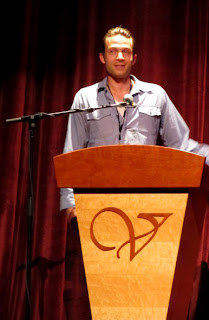Roger Ebert selects a wonderfully eclectic mix of films for the enjoyment of us EbertFest festival-goers, across the full timespan of cinema history. A silent film. Foreign films. Some indies. And this year, three studio films. These are major films, but not the current popcorn films playing at the local multiplex. No, these are underappreciated gems from as far back as "Only You", and as current as "Me and Orson Welles" and "Leaves of Grass".
1.
"Me and Orson Welles" - directed by Richard Linklater
Honestly, I almost walked out of this film in the first 30 minutes. Which would have been my mistake.
It wasn't the movie's fault. It was me. I was disoriented. Keep in mind that I had watched 4 movies at the festival by the Friday 4pm screening of "Me and Orson Welles". I had watched one silent film from 1927, and 3 indie films. I had a mindset going. A mood. A tone. And then here onscreen comes a Hollywood big(ger) budget film with A-List actors (the luminous Claire Danes for God's sake), extravagant sets, period costumes / cars / music, professional lighting, crane camera shots, etc. It was too much. I was stunned.
But, I stayed and I enjoyed not only the film but the informative Q&A panel afterwards with the colorful director Richard Linklater. His thoroughly animated discussion made it hard to take a candid photograph without at least one blurred hand. I learned 3 key things during the Q&A:
1. Orson Welles was a bigger than life figure with a storied career in Hollywood. Linklater noted that it would be impossible to capture all of Welles in one film. If many directors would film one small piece of Welles, collectively they could capture him. Linklater chose as his piece this mostly true story set in 1937, early in Welles career.
2. Linklater knew that finding the right actor to play Welles was the make or break casting decision, and had to be made before the film would be a reality. He found him in British actor Christian McKay. He also believed in the casting of Zac Efron, who he thought had a broader range than he was known for.
**McKay certainly has the look and sound of Welles, I'll give him that. Although, I thought in the first third of the movie that he was working too hard to establish it. Almost winking at the camera in a "Look at me, I'm Orson Welles!" way. But, it grew on me.
3. The cast includes a lot of well-known British actors who took seriously the play within the movie - Ceasar. They gave thought briefly to getting a theater in New York for a couple of weeks after wrapping the movie and putting on the play of Ceasar.
The story turns on Zac Effron's character. The Me in "Me in Orson Welles". He plays an ambitious high school student who stumbles into Welles production and shoots to the top through luck and perserverance and grit. A little drumming, a little dance, and little prose, a little improvised ukele, and he's in the company. Can he pull it off? How far will he go? With some help from Danes' character - the theater secretary, and a social climber - he has a chance. Efron is the romantic character, Danes the gritty realist.
I enjoyed the finely crafted plot. Early setups with satisfying payoffs - like Effron's opening scenes chance encounter with aspiring writer Gretta in the music store, and again in a musuem. Life in the theater. Orson as a force of nature. Very entertaining. I just had one request by the end of the movie: More Gretta, please.
My Tweet after the film, Gretta's last line: "It's all ahead of us." As it was for Welles.
Note: I'm watching the DVD tonight at home with my wife and kids. Wow. Way too much cussing. I didn't notice that at EbertFest.
Intermission: I had some wonderful conversations with my fellow festival goers
- two gentlemen behind me were having an animated political discussion, reveling in thrashing right-wingers and Tea Partiers - oblivious that I was one of each. I eventually turned with a smile and said "You know what the great thing about EbertFest is? You're who you are and I'm a Tea Partier and we're here watching great films together." Surprised look on their face - priceless.
- meeting the quiet and polite young man next to me in row 2C, house left. Mr. Tim B Martens. We shared our full immersion experiences at the festival, and then our Twitter addresses - each doing a "follow" of each other on the spot. Turns out us two were carrying a significant portion of the tweets at the #EbertFest hashtag, sitting right next to each other. Tim wrote a terrific piece in the Daily Illini later on.
2. "Only You"
Norman Jewison's lovely romantic movie about fate, set in Italy, and starring a very young and very lovely and very romantic Marisa Tomei. And oh, there were some guys in the movie. (An early Robert Downey Jr.)
How could you not love Marisa Tomei in this movie? I loved her short haircut, her infectious smile, her romantic innocence. Same goes for the delightful Bonnie Hunt, who carries a lot of the weight of the comedy as the married friend who accompanies Tomei around Italy on a lark to fulfill her romantic destiny. Here's a great Bonnie Hunt line, as she's comforting Tomei after a moment of betrayal:
"I married a liar. How do I know? Because, I married a man." Funny. Ouch, but funny.
I loved this movie, all the way through. And I was blown away by the Q&A session with director Norman Jewison. This man has an accomplished history. He could tell stories about Oscar winning pictures and big name actors for hours, and I would stay for hours to listen.
He answered with frivolity, as when he was asked why he made this movie and he answered that he wanted to make a movie in Italy - which he loved.
And he answered questions with depth of soul. Roger's Far-Flung correspondent Anath White asked him why he made movies about social justice, like his Academy Award winning film "In the Heat of the Night". Jewison told a moving tale about an experience that he had in his youth that had opened his eyes to injustice. He was in the South, Memphis I believe, waiting for a bus in his Canadian Navy uniform. He boarded the bus and headed to the back of the bus where there was a good breeze, when he was confronted by the voice of the bus driver. "Hey, are you trying to be funny?" As he looked back forward, he realized that there was a line drawn at the middle of the bus and a swinging tin sign handlettered to read "Blacks to the back of the bus". He was mortified. Embarrassed. He didn't know what to do. So, he picked up his bag and walked off of the bus and never forgot that moment. That moment led to working with Sidney Poitier in the groundbreaking "In the Heat of the Night".
"Only You" is not so serious. It's a romantic romp. A travelogue in love with the gorgeous scenes of Italy's cities and glorious seacoast. It asks the question is there one soulmate fated for us? Should Tomei settle, and marry a perfectly fine podiatrist? Or, does she hold out and race across the ocean for a longshot at finding the soulmate predicted by name in childhood by a Ouija board and a carnival fortune teller? Well, romance dictates the second. And a fine movie it makes.
That takes me to Saturday night and...
3. "Leaves of Grass"
Tim Blake Nelson, the Hollywood VIP guest I most wanted to see, brought this film that he wrote and directed to EbertFest. Nelson often plays blue collar rednecks in films, as he does in this one, but is in real life quite accomplished and studied in the ways of poetry and philosophy. Those two aspects of himself are expressed in his movie in the form of twin brothers Bill and Brady.
Chaz expressed Roger's admiration of Nelson as she introduced him before the film was shown. Nelson echoed that, with the rejoinder that he admires Roger more. Because of Roger's glowing review of Leaves of Grass, Nelson was able to get theatrical release.
The film's opening scene has Bill, the polished brother, giving a lecture at an ivy league school in Providence. The gist of the lecture on the classics is that man should live his life in as controlled a means as possible, but that this is illusory and when he thinks he has it controlled he pretends divinity and that's when it comes crashing down. Which, of course, foreshadows his reunion with his pot-growing twin brother Brady and the chaos that ensues. Nelson acts in a supporting role as Bolger, Brady's Okie friend and pot-growing associate.
Note: I took a restroom break at a crucial point in the movie and missed someone's demise. But, I did pause in the lobby with my Canon SLR and take my favorite picture of the whole festival - of the popcorn machine in the Virginia's lobby. Love that pic. It's in my gallery of EbertFest pics at:
Lick Creek Photography
Nelson lived up to his billing in the Q&A. I snapped a lot of candid pics. Kicking myself that I missed the perfect pic from the 3rd row when he leaned forward in his chair and, describing the methods that various directors frame shots, looked right at me through his hand formed in a "L" frame. The absolute perfect pic of the festival, and my camera was off. Missed it! But, I see it in my mind's eye. I got this instead.
One aspect that Tim Blake Nelson shared in the Q&A was that of shooting twins. He wanted to move past the typical trick of splitting the screen in half with one on one side and the other on the other statically. He wanted them to interact. To put hands on each other. To finish each others sentences. He succeeded spectacularly, I think.
He also enjoyed screening his picture in the grand theater that is the Virginia, on a college campus with an educated film audience. He said his line about the OED dictionary had never gotten a bigger laugh. As did he audience question: "What did you do with all of that weed when you finished filming?"
Loved Leaves of Grass. I loved all fo the acting performances by the stellar cast, including: Ed Norton, Tim Blake Nelson, Susan Sarandon, Richard Dreyfuss, the lovely Keri Russell, and the actress that plays Rose on Two and a Half Men, among others.
As the lights went up, I immediately Tweeted these 5 lines that stuck in my mind during the film:
- "I don't take accidental encounters for granted"
- "Just a little bitty taste?"
- "It's not good to have unresolved issues with your mother"
- "Do you have a spiritual aversion to monofilament?"
- "All of us, we are breaking the world. Repair it."
Postscript: I rented it on DVD and watched it also tonight to catch the scene I missed at EbertFest. Ah, now it all makes sense.



















